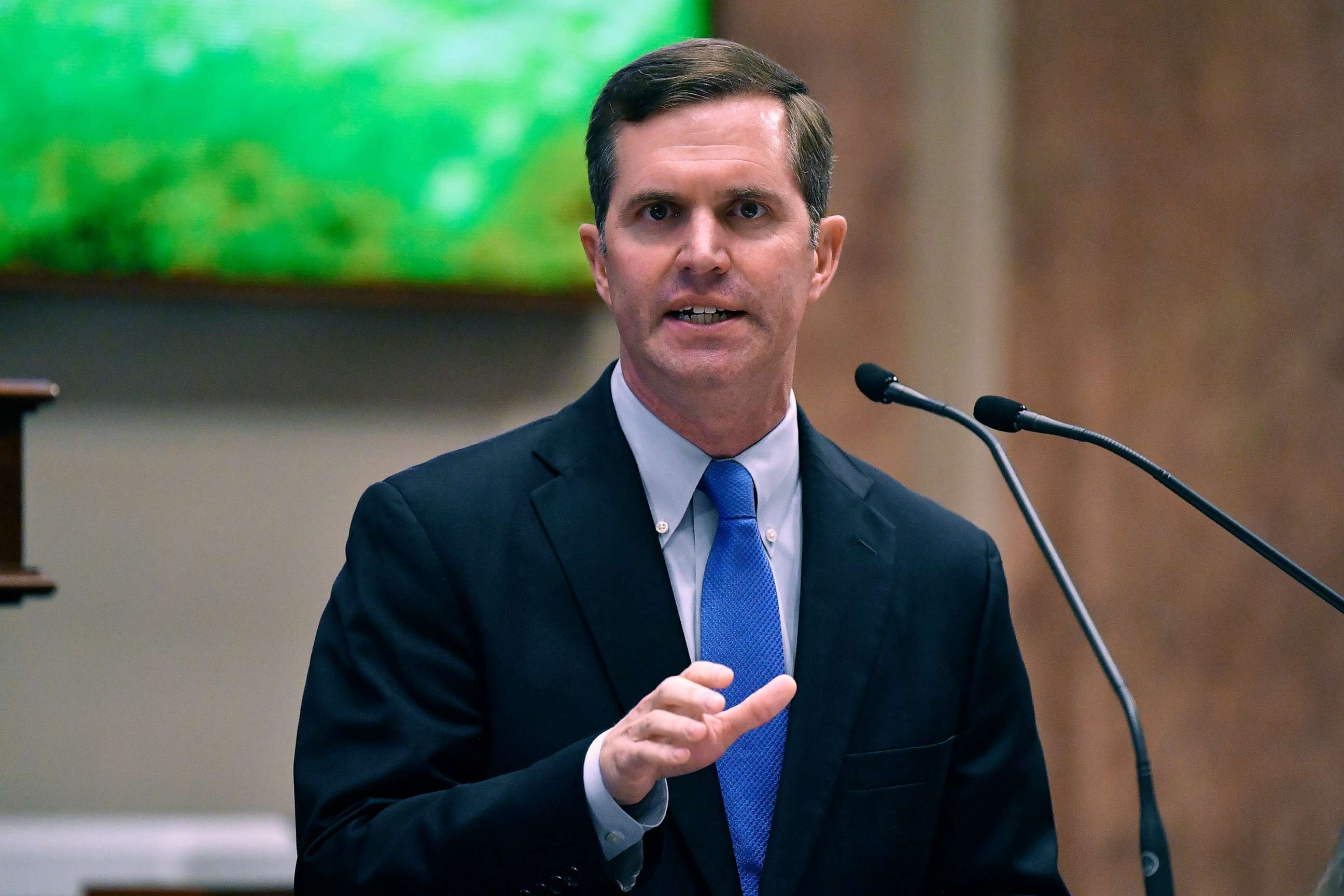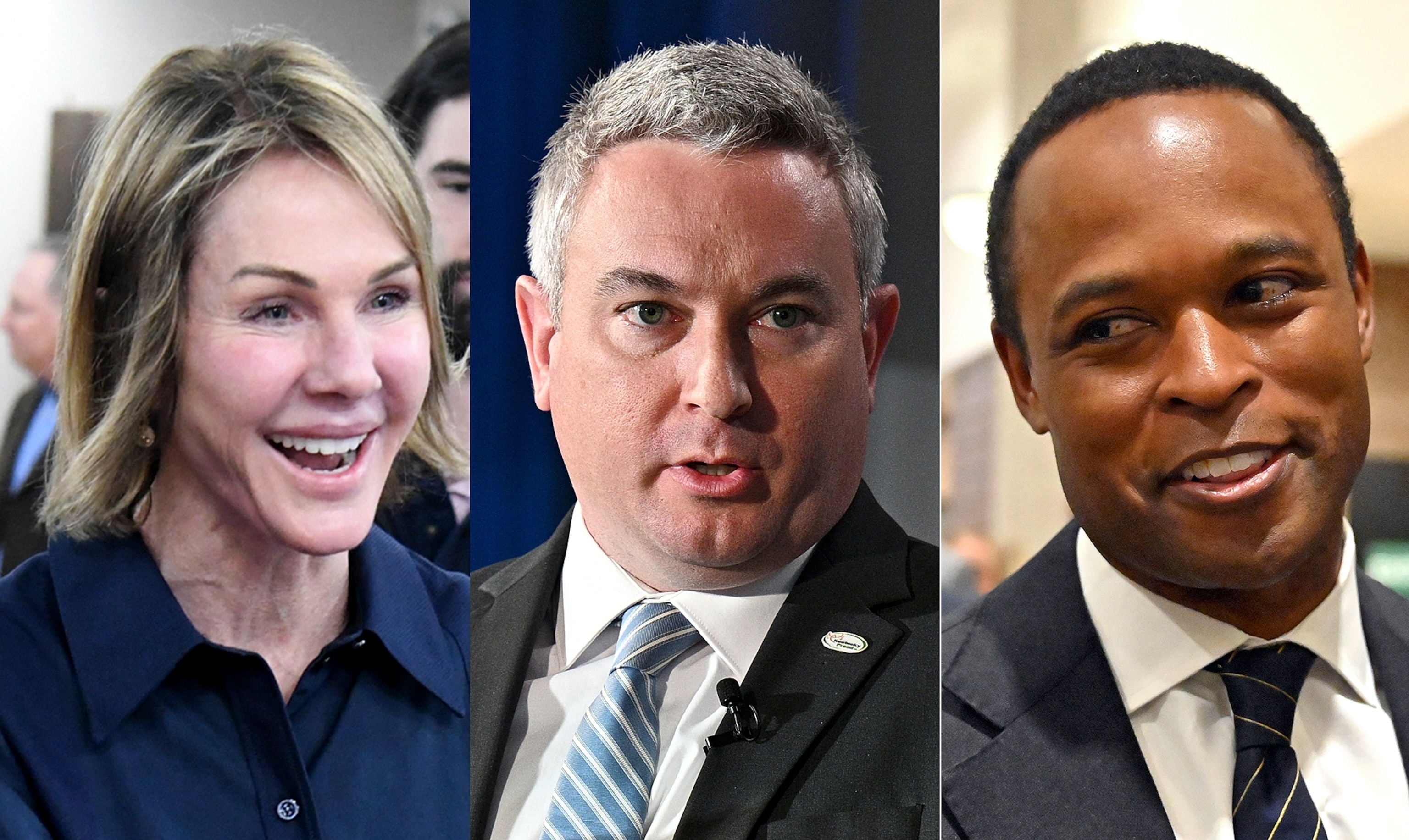Can Kentucky's Democratic governor win again? Why experts say the race has clues for 2024
Andy Beshear earned an upset in 2019 and his party is hoping for a repeat.
Kentucky's gubernatorial race later this year is set to serve as a stress test for Democrats' ability to survive in GOP-dominated states, local operatives and observers say -- as the party's hold on the Senate and White House relies on 2024 contests in similarly red and purple swaths of the country.
First-term Gov. Andy Beshear, a Democrat who beat Republican predecessor Matt Bevin by only about 5,000 votes in 2019, enters his reelection without Bevin's unpopularity and with broad name recognition and a platform divorced from national debates and focused on local issues.
After four years in office, according to strategists, Beshear doesn't have some of Bevin's liabilities as a candidate. A former state attorney general -- whose father, also a Democrat, was governor from 2007-2015 -- Beshear has emphasized his work helping Kentucky recover from a string of natural disasters and the COVID-19 pandemic while shrugging off nationalized labels.
That go-everywhere approach, even Republican critics acknowledge, helps burnish his reputation as both an executive and empathizer.
"Beshear is going to be difficult to beat, and I would argue he's probably the front-runner," said Kentucky-based GOP strategist Scott Jennings, an adviser to Senate Minority Leader Mitch McConnell.
Still, Beshear has one main weakness, according to his opponents: He's a Democrat in a ruby-red state where Republicans dominate many levels of government.

The outcome of his reelection bid, with his Republican challenger still not decided, could indicate the viability of candidates like him in races next year in Republican-friendly Montana, Ohio and West Virginia, where Democrats are defending Senate seats and hoping to hold onto their narrow majority in the chamber.
The path for President Joe Biden's 2024 reelection, should he run again as expected, likely also relies on winning traditionally Republican states like Arizona and Georgia, as he did in 2020.
Both parties are already rifling for clues to next year's political atmosphere.
Beshear's upset win in 2019 held hints for the following cycle, Jennings told ABC News: "I think you might be able to look in certain kinds of voter pockets and demographic pockets and see who did what. I do think some of the suburban, center right-ish, moderate-type Republicans held out against Bevin in '19 and that was a little bit of a foreshadowing of what happened to Trump in '20."
"I also think that demographically, Beshear does a little better with older voters than Democrats do. That's something that I think Biden experienced in '20," Jennings said.
Blueprint for success?
Beshear has occupied a somewhat hard-to-define position on the ideological spectrum, opposing strict abortion restrictions, legalizing medical marijuana and allowing voting rights for felons, with exceptions, while also advocating for certain tax cuts and raising state trooper pay.
He's also portrayed himself as a strong steward of the state economy, celebrating a $5.8 billion investment by Ford announced in 2021 while boasting of an unemployment rate at or below 3.9% for the longest stretch in state history.
The governor "has been pretty savvy at trying to position himself as a non-ideological actor, almost like a technocrat or a bureaucrat," Jennings said.
Even as Jennings felt that Beshear had "done some things ... that have been terribly liberal," those decisions "haven't gotten the attention that the rest of the things he's done in his term have gotten. That's where the Republicans have to draw that out."
Perhaps more than anything, Kentucky political experts said, Beshear's brand has been boosted by his on-the-ground response to a deadly tornado in the western part of the state in 2021 and flooding in eastern Kentucky last year.
"It's harder to demonize somebody when they have looked you in the eye, they've shaken your hand, they've given you a hug, they helped out your community directly," said Kentucky Democratic strategist Mark Riddle.

Beshear -- whose office did not make him available for this story -- has been leaning into that above-the-fray messaging, telling Kentuckians he's not interested in partisan labels.
"I think people see that this administration isn't trying to pull Kentucky to the right or left, but just to move it forward," he said at a press conference last month.
Beshear heads into the November race with his locally famous last name, the legacy of narrowly defeating a historically unpopular Republican governor and the avoidance of a serious primary challenge.
"Gov. Beshear is one of the most popular governors in America because he attends to the bread-and-butter issues impacting Kentucky lives, whether it's natural disasters to new Ford truck jobs to the opioid crisis," said Irene Lin, a Democratic strategist based in Ohio, where Democratic Sen. Sherrod Brown hopes to buck his state's rightward shift and win a fourth term.
Beshear, Lin said, has "been outspoken about how his Christian faith informs his values. I think those are blueprints all Dems should look to for success in tough states."
But he's also been largely unscathed by Republican attacks so far and will have to convince a broad swath of Republicans to vote for him again against a nominee who is not anticipated to be bogged down as Bevin was.
"I think that Andy Beshear is in about as strong a position as a Democratic incumbent governor could be in Kentucky, but that's still far from an assured victory because so much in the state has become so red in recent years," Kentucky GOP political consultant T.J. Litafik said. "That dynamic is hard to overcome when you have such a huge chunk of the electorate that's just reflexively voting against Democrats."
"It will be a much different dynamic than running against a deeply unpopular governor," he added.

Beshear's Republican challengers
Among the major candidates running to unseat Beshear are state Attorney General Daniel Cameron, Trump-era U.S. Ambassador to the U.N. Kelly Craft and state Agriculture Commissioner Ryan Quarles.
Strategists said their task, should one of them make it through the May 16 primary, would be to nationalize the gubernatorial race and paint Beshear with the same brush used on other GOP targets like President Biden or former Speaker Nancy Pelosi, D-Calif.
"Can someone prosecute a case against Andy Beshear that makes it clear that he is just as liberal as every other national Democrat that you hate?" Jennings said. "If that case can be prosecuted by someone who is viewed as a mainstream, conservative Republican, then I don't see any reason why we couldn't win."
"When a community is standing in six feet of water in eastern Kentucky, it's not really the time to be lobbing partisan grenades at a governor. I do think Republicans have respected that. But now, it's time to take stock of his tenure," Jennings said.
But first, Republicans, who are going through their own transformations, will have to choose a nominee.
All three of the top candidates have unique backstories and advantages: Cameron is seen as a rising star and is a protégé of McConnell, the Senate GOP leader; Craft is independently wealthy and can bankroll her bid single-handedly; Quarles has extensive experience in state government.
Yet ideologically, the three are all viewed fairly similarly, and even sources close to each campaign struggled to come up with substantive differences.
"There may be an opportunity for one of the other candidates to come up if they can find their lane and if they can formulate a message that stands out from the rest of the pack. Because, honestly, right now, the three front-runners are running very benign campaigns and really aren't crafting any memorable messages to appeal to voters," Litafik said.
Strategists disagreed over whether the risk was too great of one candidate veering to the right to separate themselves. Bevin, a Tea Party favorite, adopted hardline stances and an overbearing strategy before he was defeated, which some interpret as a warning sign.
But others said that shifting to the right while not appearing quite as haughty wouldn't inflict harm in a general election.
"I don't think so," Fayette County GOP Chair Fran Anderson said. "Not in Kentucky."




